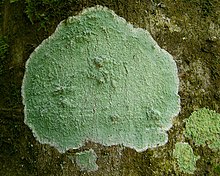Verseghya is a genus of lichen-forming fungi in the family Pertusariaceae. It has two species.[1] The genus was circumscribed in 2016 by lichenologists Sergey Kondratyuk, Laszlo Lőkös, and Jae-Seoun Hur, with Verseghya klarae assigned as the type species. This crustose species is found in South Korea, where it grows on the bark of a wide variety of both deciduous and coniferous trees. Molecular phylogenetic analysis showed that Verseghya klarae occupied a separate phylogenetic branch in the Pertusariaceae, situated between the genera Ochrolechia and Pertusaria and the Lecanora subcarnea species complex.[2] Verseghya thysanophora was transferred to the genus (from Lecanora) in 2019. It is widely distributed in the Northern Hemisphere.[3]
| Verseghya | |
|---|---|

| |
| The "mapledust lichen", Verseghya thysanophora | |
| Scientific classification | |
| Domain: | Eukaryota |
| Kingdom: | Fungi |
| Division: | Ascomycota |
| Class: | Lecanoromycetes |
| Order: | Pertusariales |
| Family: | Pertusariaceae |
| Genus: | Verseghya S.Y.Kondr., Lőkös & Hur (2016) |
| Type species | |
| Verseghya klarae S.Y.Kondr., Lőkös & Hur (2016)
| |
| Species | |
Both the genus name and species epithet of the type honour Hungarian lichenologist Klára Verseghy (1930–2020), who, according to the authors, "has made important contributions to our knowledge on species diversity of the genus Ochrolechia".[2]
Nectriopsis verseghyae-klarae is a lichenicolous fungus that parasitises Verseghya klarae.[4]
Species
edit- Verseghya klarae S.Y. Kondr., Lőkös & Hur (2016) – South Korea
- Verseghya thysanophora (R.C.Harris) S.Y.Kondr., Lőkös, Farkas & Hur (2019) – widespread in Northern Hemisphere
References
edit- ^ "Verseghya". Catalogue of Life. Species 2000: Leiden, the Netherlands. Retrieved 15 November 2022.
- ^ a b Kondratyuk, S.Y.; Lőkös, L.; Halda, J.P.; Haji Moniri, M.; Farkas, E.; Park, J.S.; Lee, B.G.; Oh, S.O.; Hur, J.S. (2016). "New and noteworthy lichen-forming and lichenicolous fungi 4" (PDF). Acta Botanica Hungarica. 58 (1–2): 75–136. doi:10.1556/034.58.2016.1-2.4.
- ^ Kondratyuk, S. Y.; Lőkös, L.; Jang, S.-H.; Hur, J.-S.; Farkas, E. (2019). "Phylogeny and taxonomy of Polyozosia, Sedelnikovaea and Verseghya of the Lecanoraceae (Lecanorales, lichen-forming Ascomycota)" (PDF). Acta Botanica Hungarica. 61 (1–2): 137–184. doi:10.1556/034.61.2019.1-2.9. S2CID 133258087.
- ^ Diederich, Paul; Lawrey, James D.; Ertz, Damien (2018). "The 2018 classification and checklist of lichenicolous fungi, with 2000 non-lichenized, obligately lichenicolous taxa". The Bryologist. 121 (3): 340–425 [382]. doi:10.1639/0007-2745-121.3.340. S2CID 92396850.